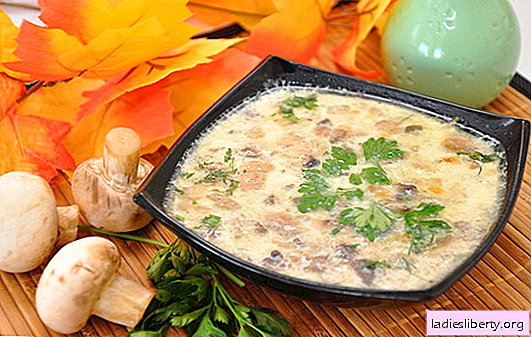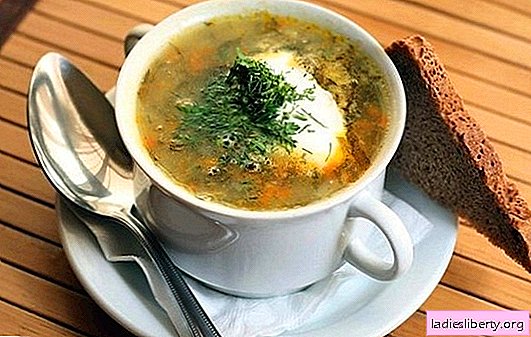
Jerusalem artichoke - general description
Jerusalem artichoke (popularly - an earthen pear) - a species of perennial tuberous plants of the aster family with a high (up to two or more meters) straight stem covered with short hairs and root shoots, at the ends of which edible tubers develop. The leaves of Jerusalem artichoke are petiolate, serrate along the edges, have a heart-ovate shape. The plant is considered the closest relative of sunflower.
At the end of the stem in August, a yellow basket forms, very similar to a sunflower flower, but with a significantly smaller size. The fruit in the form of a small achene ripens in September. Cultivars of Jerusalem artichoke are cultivated as a valuable fodder and food product having good taste and nutritional qualities.
Jerusalem artichoke - types and places of growth
In nature, there are about 300 varieties of Jerusalem artichoke, and only 10 of them grow under natural conditions on the continent - North America. In some species, tubers are large and juicy, in others they are small and dry, and in others they are completely absent; such species are usually used as ornamental plants.
In our country, the most common:
- Jerusalem artichoke is white;
- Jerusalem artichoke is red;
- Jerusalem artichoke Maykop;
- Jerusalem artichoke "chambers";
- Jerusalem artichoke fusiform;
- Jerusalem artichoke;
- a hybrid variety of Jerusalem artichoke "interest", which is several times higher than the yield of other species.
The chemical composition of plant tubers is very similar to potato tubers. However, unlike it, Jerusalem artichoke is not stored for a long time, and also contains more polysaccharides, vitamins and minerals. Most varieties of earthen pears are undemanding to care, soil and living conditions, winter-hardy, but can die in the harsh conditions of Northern Russia.
Jerusalem artichoke - healing properties
Jerusalem artichoke root crops are rich in inulin, which is why they have a specific sweet taste. In addition, tubers are a source of vitamin C, potassium, magnesium, iron and fiber. These substances make Jerusalem artichoke not only a delicious product, but also extremely useful. Root juice reduces the acidity of the stomach, eliminates constipation and abdominal pain, has an anti-inflammatory effect, and lowers cholesterol.
Decoction from the plant has a sugar-lowering property, thereby improving the condition of diabetics, increasing hemoglobin, preventing obesity and salt deposition, neutralizing the effect of toxins and heavy metal compounds on the body, which is especially important for residents of megacities. Jerusalem artichoke found its application in cosmetology, where it is used as a means of eliminating wrinkles.
Jerusalem artichoke - dosage forms
Healing raw materials - grass collected at the initial stage of flowering, and Jerusalem artichoke tubers, which must be dug up immediately before use. Storage is possible, but should be done no more than a week, in a plastic container and in cold conditions. The tubers are well preserved in the soil until spring, but quickly deteriorate in the air. Jerusalem artichoke grass is used fresh or dry for making tea, salads, decoctions and infusions.
Jerusalem artichoke - recipes of traditional medicine
- The easiest way to improve your health and preventive health is to eat fresh Jerusalem artichoke tubers with peels of 50 g each. one to three times a day.
- It is advisable to take squeezed juice daily in ½ cup for 12-15 days for gastrointestinal diseases.
- Refreshing kvass from earthen pear: chop the tubers, add cold water, add a little yeast, you can slice the rye bread and leave it in a warm place for three to four days. Drinking such kvass is recommended every day as an excellent prophylactic (for diabetes mellitus) and multivitamin.
- A decoction that reduces blood pressure and sugar: cut three root vegetables and throw into boiling water (1 liter), cook for 10-12 minutes, then drain and consume 200-400 ml of liquid per day.
- Baths with the addition of decoctions from Jerusalem artichoke leaves are recommended for weakening immunity, joint diseases, overwork. The required number of procedures is 8-12 baths.
- Wrinkle mask: peel, grate and apply 2-3 p. To the face. in Week. Such a mask returns the skin its pristine elasticity and smoothness.
Jerusalem artichoke - contraindications
No contraindications have been identified. However, it should be noted that tubers and leaves consumed in excessively large quantities can cause flatulence.
Comments











